- Home
- Tom Sharpe
Porterhouse Blue Page 2
Porterhouse Blue Read online
Page 2
‘Outrageous,’ said the Dean, discreetly combining protest with eructation. ‘One might have imagined he was addressing an electoral meeting.’
‘It was certainly a very inauspicious start,’ said the Senior Tutor. ‘One would have expected a greater regard for tradition. When all is said and done we are an old college.’
‘All may have been said, though I doubt your optimism,’ said the Dean, ‘but it has certainly not been done. The Master’s infatuation with contemporary fashions of opinion may lead him to suppose that we are flattered by his presence. It is an illusion the scourings of party politics too naturally assume. I for one am unimpressed.’
‘I must admit that I find his nomination most curious,’ said the Praelector. ‘One wonders what the Prime Minister had in mind.’
‘The Government’s majority is not a substantial one,’ said the Senior Tutor. ‘I should imagine he was ridding himself of a liability. If this evening’s lamentable speech was anything to go by, Sir Godber’s statements in the Commons must have raised a good many hackles on the back benches. Besides, his record of achievement is not an enviable one.’
‘It still seems odd to me,’ said the Praelector, ‘that we should have been chosen for his retirement.’
‘Perhaps his bark is worse than his bite,’ said the Bursar hopefully.
‘Bite?’ shouted the Chaplain. ‘But I’ve only just finished dinner. Not another morsel, thank you all the same.’
‘One must assume that it was a case of any port in a storm,’ said the Dean.
The Chaplain looked appalled.
‘Port?’ he screamed. ‘After brandy? I can’t think what this place is coming to.’ He shuddered and promptly fell asleep again.
‘I can’t think what the Chaplain is coming to, come to that,’ said the Praelector sadly. ‘He gets worse by the day.’
‘Anno domini,’ said the Dean, ‘anno domini, I’m afraid.’
‘Not a particularly happy expression, Dean,’ said the Senior Tutor, who still retained some vestiges of a classical education, ‘in the circumstances.’
The Dean looked at him lividly. He disliked the Senior Tutor and found his allusions distinctly trying.
‘The year of our Lord,’ the Senior Tutor explained. ‘I have the notion that our Master sees himself in the role of the creator. We shall have our work cut out preventing him from overexerting himself. We have our faults I daresay but they are not ones I would wish to see Sir Godber Evans remedy.’
‘I am sure the Master will allow himself to be guided by our advice,’ said the Praelector. ‘We have had some obdurate Masters in the past. Canon Bowel had some ill-advised notions about altering the Chapel services, I seem to recall.’
‘He wanted compulsory Compline,’ said the Dean.
‘A fearful thought,’ the Senior Tutor agreed. ‘It would have interfered with the digestive process.’
‘The point was made to him,’ the Dean continued, ‘after a particularly good dinner. We had had devilled crabs with jugged hare to follow. I think it was the cigars that did it. That and the zabaglione.’
‘Zabaglione?’ shouted the Chaplain. ‘It’s a little late but I daresay …’
‘We were talking about Canon Bowel,’ the Bursar explained to him.
The Chaplain shook his head. ‘Couldn’t abide the man,’ he said. ‘Used to live on poached cod.’
‘He had a peptic ulcer.’
‘I’m not surprised,’ said the Chaplain. ‘With a name like that he should have known better.’
‘To return to the present Master,’ the Senior Tutor said, ‘I am not prepared to sit back and allow him to alter our present admissions policy.’
‘I don’t see how we can afford to,’ the Bursar agreed. ‘We are not a rich college.’
‘The point will have to be made to him,’ the Dean said. ‘We look to you, Bursar, to see that he understands it.’ The Bursar nodded dutifully. His was not a strong constitution and the Dean overawed him.
‘I shall do my best,’ he said.
‘And as far as the College Council is concerned I think the best policy will be one of … er … amiable inertia,’ the Praelector suggested. ‘That has always been one of our strong points.’
‘There’s nothing like prevarication,’ the Dean agreed, ‘I have yet to meet a liberal who can withstand the attrition of prolonged discussion of the inessentials.’
‘You don’t think the Bowel treatment, to coin a phrase?’ the Senior Tutor asked.
The Dean smiled and stubbed out his cigar.
‘There are more ways of killing a cat than stuffing it with …’
‘Hush,’ said the Praelector, but the Chaplain slept on. He was dreaming of the girls in Woolworths.
They left him sitting there and went out into the Court, their gowns wrapped round them against the cold. Like so many black puddings, they made their way to their rooms. Only the Bursar lived out with his wife. Porterhouse was still a very old-fashioned college.
*
In the Porter’s Lodge Skullion sat in front of the gas fire polishing his shoes. A tin of black polish stood on the table beside him and every few minutes he would dip the corner of his yellow duster into the tin and smear the polish on to the toe of his shoe with little circular movements. Round and round his finger would go inside the duster while the toecap dulled momentarily and grew to a new and deeper shine. Every now and then Skullion would spit on the cap and then rub it again with an even lighter touch before picking up a clean duster and polishing the cap until it shone like black japan. Finally he would hold the shoe away from him so that it caught the light and he could see deep in the brilliant polish a dark distorted reflection of himself. Only then would he put the shoe to one side and start on the other.
It was something he had learnt to do in the Marines so many years ago and the ritual still had the satisfying effect it had had then. In some obscure way it seemed to ward off the thought of the future and all the threats implicit in that future, as if tomorrow was always a regimental sergeant-major and an inspection and change could be propitiated by a gleaming pair of boots. All the time his pipe smoked out of the corner of his mouth and the mantles of the gas fire darkened or glowed in the draught and the snow fell outside. And all the time Skullion’s mind, protected by the ritual and the artefacts of habit, digested the import of the Master’s speech. Change? There was always change and what good did it do? Skullion could think of nothing good in change. His memory ranged back over the decades in search of certainty and found it only in the assurance of men. Men no longer living or, if not dead, distant and forgotten, ignored by a world in search of effervescent novelty. But he had seen their assurance in his youth and had been infected by it so that now, even now, he could call it up like some familiar from the past to calm the seething uncertainties of the present. Quality, he had called it, this assurance that those old men had. Quality. He couldn’t define it or fix it to particulars. They had had it, that was all, and some of them had been fools or blackguards come to that but when they’d spoken there’d been a harshness in their voices as if they didn’t give a damn for anything. No doubts, that’s what they’d had, or if they had them kept them to themselves instead of spreading their uncertainties about until you were left wondering who or where you were. Skullion spat on his shoe in memory of such men and their assurance and polished his reflection by the fire. Above him the tower clock whirred and rumbled before striking twelve. Skullion put on his shoes and went outside. The snow was falling still and the Court and all the College roofs were white. He went to the postern gate and looked outside. A car slushed by and all the way up King’s Parade the lamps shone orange through the falling snow. Skullion went in and shut the door. The outside world was none of his affair. It had a bleakness that he didn’t want to know.
He went back into the Porter’s Lodge and sat down again with his pipe. Around him the paraphernalia of his office, the old wooden clock, the counter, the rows of pigeonholes, the keyboar
d and the blackboard with ‘Message for Dr Messmer’ scrawled on it, were reassuring relics of his tenure and reminders that he was still needed. For forty-five years Skullion had sat in the Lodge watching over the comings and goings of Porterhouse until it seemed he was as much a part of the College as the carved heraldic beasts on the tower above. A lifetime of little duties easily attended to while the world outside stormed by in a maelstrom of change had bred in Skullion a devotion to the changelessness of Porterhouse traditions. When he’d first come there’d been an Empire, the greatest Empire that the world had known, a Navy, the greatest Navy in the world, fifteen battleships, seventy cruisers, two hundred destroyers, and Skullion had been a keyboard sentry on the Nelson with her three for’ard turrets and her arse cut off to meet the terms of some damned treaty. And now there was nothing left of that. Only Porterhouse was still the same. Porterhouse and Skullion, relics of an old tradition. As for the intellectual life of the College, Skullion neither knew nor cared about it. It was as incomprehensible to him as the rigmarole of a Latin mass to some illiterate peasant. They could say or think what they liked. It was the men he worshipped, some at least and fewer these days, their habits and the trappings he associated with that old assurance. The Dean’s, ‘Good morning, Skullion,’ Dr Huntley’s silk shirts, the Chaplain’s evening stroll around the Fellows’ Garden, Mr Lyons’ music evening every Friday, the weekly parcel from the Institute for Dr Baxter. Chapel, Hall, the Feast, the meeting of the College Council, all these occasions like internal seasons marked the calendar of Skullion’s life and all the time he looked for that assurance that had once been the hallmark of a gentleman.
Now sitting there with the gas fire hissing before him he searched his mind for what it was those old men signified. It wasn’t that they were clever. Some were, but half were stupid, more stupid than the young men coming up these days. Money? Some had a lot and others hadn’t. That wasn’t what had made the difference. To him at least. Perhaps it had to them. A race apart they were. Helpless half of them. Couldn’t make their beds, or wouldn’t. And arrogant. ‘Skullion this and Skullion that.’ Oh, he’d resented it at the time and done it all the same and hadn’t minded afterwards because … because they’d been gentlemen. He spat into the fire affectionately and remembered an argument he’d had once with a young pup in a pub who’d heard him going on about the good old days.
‘What gentlemen?’ the lad had said. ‘A lot of rich bastards with nothing between their ears who just exploited you.’
And Skullion had put down his pint and said, ‘A gentleman stood for something. It wasn’t what he was. It was what he knew he ought to be. And that’s something you will never know.’ Not what they were but what they ought to be, like some old battle standard that you followed because it was a symbol of the best. A ragged tattered piece of cloth that stood for something and gave you confidence and something to fight for.
He got up and walked across the Court and through the Screens and down the Fellows’ Garden to the back gate. Everywhere the snow had submerged the details of the garden. Skullion’s feet on the gravel path were soundless. In a few rooms lights still burned. The Dean’s windows were still alight.
‘Brooding on the speech,’ Skullion thought and glanced reproachfully at the Master’s Lodge where all was dark. At the back gate he stood looking up at the rows of iron spikes that topped the wall and the gate. How often in the old days he had stood there in the shadow of the beech-trees watching young gentlemen negotiate those spikes only to step out and take their names. He could remember a good many of those names still and see the startled faces turned towards his as he stepped out into the light.
‘Good morning, Mr Hornby. Dean’s report in the morning, sir.’
‘Oh damn you, Skullion. Why can’t you go to bed sometimes?’
‘College regulations, sir.’
And they had gone off to their rooms cursing cheerfully. Now no one climbed in. Instead they knocked you up at all hours. Skullion didn’t know why he bothered to come and look at the back wall any more. Out of habit. Old habit. He was just about to turn and trudge back to his bed in the Lodge when a scuffling noise stopped him in his tracks. Someone in the street was trying to climb in.
*
Zipser walked down Free School Lane past the black clunch walls of Corpus. The talk on ‘Population Control in the Indian Subcontinent’ had gone on longer than he had expected, partly due to the enthusiasm of the speaker and partly to the intractable nature of the problem itself. Zipser had not been sure which had been worse, the delivery, if that was an appropriate word to use about a speech that concerned itself with abortion, or the enthusiastic advocacy of vasectomy which had prolonged the talk beyond its expected limits. The speaker, a woman doctor with the United Nations Infant Prevention Unit in Madras, who seemed to regard infant mortality as a positive blessing, had disparaged the coil as useless, the pill as expensive, female sterilization as complicated, had described vasectomy so seductively that Zipser had found himself crossing and recrossing his legs and wishing to hell that he hadn’t come. Even now as he walked back to Porterhouse through the snow-covered streets he was filled with foreboding and a tendency to waddle. Still, even if the world seemed doomed to starvation, he had had to get out of Porterhouse for the evening. As the only research graduate in the College he found himself isolated. Below him the undergraduates pursued a wild promiscuity which he envied but dared not emulate, and above him the Fellows found compensation for their impotence in gluttony. Besides he was not a Porterhouse man, as the Dean had pointed out when he had been accepted. ‘You’ll have to live in College to get the spirit of the place,’ he had said, and while in other colleges research graduates lived in cheap and comfortable digs, Zipser found himself occupying an exceedingly expensive suite of rooms in Bull Tower and forced to follow the regime of an undergraduate. For one thing he had to be in by twelve or face the wrath of Skullion and the indelicate inquiries next morning of the Dean. The whole system was anachronistic and Zipser wished he had been accepted by one of the other colleges. Skullion’s attitude he found particularly unpleasant. The Porter seemed to regard him as an interloper, and lavished a wealth of invective on him normally reserved for tradesmen. Zipser’s attempts to mollify him by explaining that Durham was a university and that there had been a Durham College in Oxford in 1380 had failed hopelessly. If anything, the mention of Oxford had increased Skullion’s antipathy.
‘This is a gentleman’s college,’ he had said, and Zipser, who didn’t claim to be even a putative gentleman, had been a marked man ever since. Skullion had it in for him.
As he crossed Market Hill he glanced at the Guildhall clock. It was twelve thirty-five. The main gate would be shut and Skullion in bed. Zipser slackened his pace. There was no point in hurrying now. He might just as well stay out all night now. He certainly wasn’t going to knock Skullion up and get cursed for his pains. It wouldn’t have been the first time he had wandered about Cambridge all night. Of course there was Mrs Biggs the bedder to be taken care of. She came to wake him every morning and was supposed to report him if his bed hadn’t been slept in but Mrs Biggs was accommodating. ‘A pound in the purse is worth a flea in the ear,’ she had explained after his first stint of night wandering, and Zipser had paid up cheerfully. Mrs Biggs was all right. He was fond of her. There was something almost human about her in spite of her size.
Zipser shivered. It was partly the cold and partly the thought of Mrs Biggs. The snow was falling heavily now and it was obvious he couldn’t stay out all night in this weather. It was equally clear that he wasn’t going to wake Skullion. He would have to climb in. It was an undignified thing for a graduate to do but there was no alternative. He crossed Trinity Street and went past Caius. At the bottom he turned right and came to the back gate in the lane. Above him the iron spikes on top of the wall looked more threatening than ever. Still, he couldn’t stay out. He would probably freeze to death if he did. He found a bicycle in front of Trinity Hall and dra
gged it up the lane and put it against the wall. Then he climbed up until he could grasp the spikes with his hands. He paused for a moment and then with a final kick he was up with one knee on the wall and his foot under the spikes. He eased himself up and swung the other leg over, found a foothold and jumped. He landed softly in the flowerbed and scrambled to his feet. He was just moving off down the path under the beech-tree when something moved in the shadow and a hand fell on his shoulder. Zipser reacted instinctively. With a wild flurry he struck out at his attacker and the next moment a bowler hat was in mid-air and Zipser himself, ignoring the College rules which decreed that only Fellows could walk on the lawns, was racing across the grass towards New Court. Behind him on the gravel path Skullion lay breathing heavily. Zipser glanced over his shoulder as he dashed through the gate into the Court and saw his dark shape on the ground. Then he was in O staircase and climbing the stairs to his rooms. He shut the door and stood in the darkness panting. It must have been Skullion. The bowler hat told him that. He had assaulted a College porter, bashed his face and chopped him down. He went to the window and peered out and it was then that he realized what a fool he had been. His footsteps in the snow would give him away. Skullion would follow them to the Bull Tower. But there was no sign of the Porter. Perhaps he was still lying out there unconscious. Perhaps he had knocked him out. Zipser shuddered at this fresh indication of his irrational nature, and its terrible consequences for mankind. Sex and violence, the speaker had said, were the twin poles of the world’s lifeless future, and Zipser could see now what she had meant.

 Blott on the Landscape
Blott on the Landscape Porterhouse Blue
Porterhouse Blue The Wilt Alternative:
The Wilt Alternative: The Great Pursuit
The Great Pursuit Ancestral Vices
Ancestral Vices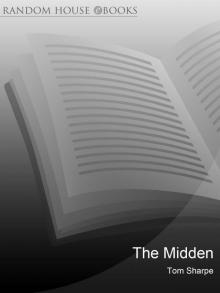 The Midden
The Midden Vintage Stuff
Vintage Stuff The Throwback
The Throwback Grantchester Grind:
Grantchester Grind: Wilt on High:
Wilt on High: Riotous Assembly
Riotous Assembly Indecent Exposure
Indecent Exposure The Gropes
The Gropes Wilt in Nowhere:
Wilt in Nowhere: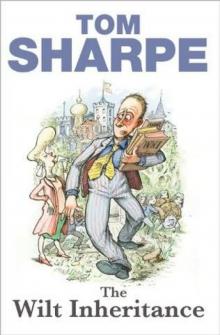 The Wilt Inheritance
The Wilt Inheritance Wilt:
Wilt: The Wilt Alternative
The Wilt Alternative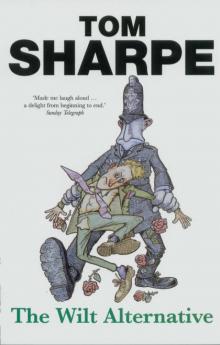 The Wilt Alternative w-2
The Wilt Alternative w-2 Grantchester Grind
Grantchester Grind Wilt on High
Wilt on High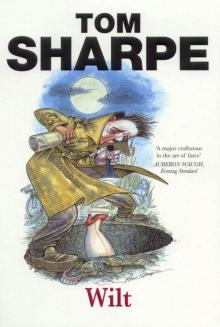 Wilt w-1
Wilt w-1 Wilt
Wilt The Wilt Inheritance (2010)
The Wilt Inheritance (2010) Wilt in Nowhere
Wilt in Nowhere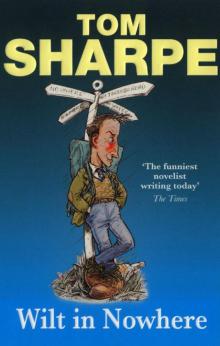 Wilt in Nowhere w-5
Wilt in Nowhere w-5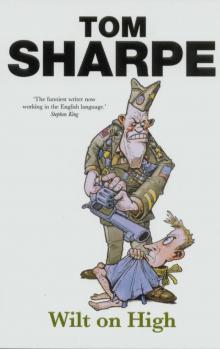 Wilt on High w-3
Wilt on High w-3